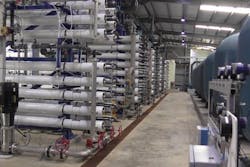A new 10,400 m3/day seawater desalination plant in the British Virgin Islands is now fully operational ahead of 2015 after a commissioning period.
Using $43 million funding from Barclays for the project, Biwater constructed the desalination plant and water storage facilities on the island of Tortola – the largest and most populated island of the British Virgin Islands.
Following the commissioning of this seawater reverse osmosis(RO)plant, Biwater will continue to operate and maintain the facility over a 16 year period.
This is part of its obligation under its Build Own Operate Transfer (BOOT) contract and Water Purchase Agreement with the Government of the Virgin Islands.
As part of Biwater’s scope of work, the company refurbished an existing storage tank and constructed a new tank of similar size, doubling storage capacity and enabling water distribution to extend to additional areas of the island.
This island-wide improvement scheme helps to meet Tortola’s water treatment capacity requirements inline with the Government’s long-term water and wastewater master plan.
In addition to benefiting local residents and businesses, the new plant supports the Government in meeting the growing demand of its tourist industry, which will see larger cruise ships dock on the island once phase one of the new ‘Cruise Pier Project’ is complete in 2015.
This will allow the Government to supply water to vessels that dock in Tortola to replenish their water storage levels.
The 10,400m3/day system is a two pass system, running at 45%. It incorporates four first pass trains and two second pass trains and is designed to run at 100% capacity.
Pre-treatment consists of two stage media filtration, followed by five micron cartridge filtration, to protect the system from foulants.
For energy recovery, pressure exchangers will be incorporated with booster pumps to the reject line to complement the high pressure pumps feed supply to the first stage RO trains.
Treated water mains total 3,330 metres, along steep terrain, with a total rise of 393 metres, including two treated water pumping stations.
In 2015, Biwater is also due to complete two package wastewater treatment plants, ‘BiCOMs’.
###
Read more
Trickling filters used in Morocco WWTP Morocco is now benefiting from the use of trickling filters at the newly commissioned Khenifra Wastewater Treatment Works…
Biwater appoints new president to desalination, membrane treatment sector Biwater has appointed Jorg Menningman as president of the company's desalination and membrane treatment sector…



